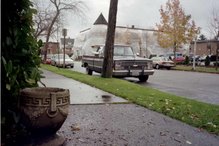One: About A Song Translation Included on a Panel During The First
2010: The Second Conference on Race and Pedagogy at UPS.
2006: The First Conference on Race and Pedagogy at UPS.
2002: The First
There was a panel discussion at UPS and I was invited by Hans Ostrom to be on the panel. I performed a folk song there - I read my song translation and performed the tune on a recorder.
The theme of "Names" in To Kill A Mockingbird had reminded me of one of the folk songs I had worked on translating from 1987 to 1992.
Atticus (the lawyer definding Tom Robinson) has a Greco-Roman name. The MayElla (the prosecution's witness and and the claimed victim) has a Christian name, Mary Elizabeth. Atticus spares his own motherless daughter and himself by calling her Scout (a nickname). She will not hear her mother call her by her name again. Atticus repeatedly calls the witness by her first name only.
At one point it is said, "The defense is badgering the winess." An important point in the novel is that the dizzying presence of a vigilante group leaves people without recourse to the law.
I believed the song translation might help develop the theme of names.
Two: About the Song and my Translation
In 1987 to 1992 I worked on about six dozen song translations during part of my writing time. My mother had been a talented piano player, accompanied the heritage group choir and in their family dance band. She saved a lot of things. There were song books, a collection of preserved folk music, from Foreningen Brage. Although Säg min vallmoblomma was not a song frequently performed by the heritage group choir, other songs in the book were.
The song Säg min vallmoblomma is reproduced in the next Blog Entry with the permission of Föreningen Brage,
My playing songs on a recorder was for me in a way a hobby - I think a hobby is carried along without a highly-powered ambition. From the first I did not consider it an ambitious kind of aspiration, but a deeply felt activity.
One heritage group member once described songs I played on a recorder as being "between her mother and herself". She was comparing me to heritage music performance from a first-hand experience in the old country, or to the music performance from the very active and present Swedish and Swedish-Finnish community in the


No comments:
Post a Comment